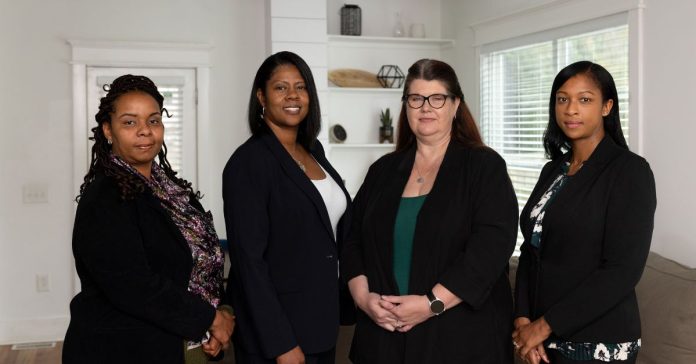
Left to right: Plaintiff Shawana Almendarez, co-founder, North Carolina Institute for Justice Project S.M. Kernodle-Hodges, Plaintiff Morag Black Polaski, and co-founder North Carolina Institute for Justice Project Alicia Mitchell-Mercer (image via Institute for Justice Project).
Two North Carolina paralegals have filed a federal lawsuit claiming that the state’s prohibition of the unauthorized practice of law violates the First Amendment, and asking the court to allow them to step in and ameliorate the state’s “legal deserts” by offering services at a cheaper price than expensive lawyers would.
North Carolina, like most states, prohibits non-lawyers from dispensing legal advice. Morag Black Polaski and Shawana Almendarez are certified paralegals with over 20 years of experience who, together with advocacy group North Carolina Justice for All Project, now claim that they want to “provide simple legal advice” to individuals regarding how to fill out common court-created legal forms.
The plaintiffs filed a complaint in federal court in North Carolina that said the state courts give unrepresented litigants online forms for summary ejectments, absolute divorces, and protective orders — forms that are “not complicated,” but that “can still be confusing.” They said that many residents cannot afford to hire a lawyer to guide them through filling out the forms, and that many who fall into the “missing middle” level of income are too poor to hire a lawyer but not poor enough to qualify for free legal help.
As paralegals, Polaski and Almendarez said, they would like to provide just the advice these would-be clients might need at a lower price than licensed attorneys. The case has been assigned to U.S. District Judge Judge Terrence W. Boyle, a Ronald Reagan appointee, and names North Carolina Attorney General Josh Stein as the defendant.
The plaintiffs argued in their complaint that advice, regardless of the topic or the price, is protected speech under the First Amendment and that as such, the state may not prohibit it unless the restriction meets the highest level of constitutional scrutiny — that it is narrowly tailored to serve a compelling government interest. Plaintiffs contend that North Carolina’s restriction cannot meet this burden.
They also said that there simply are not enough lawyers in the Tar Heel State at just 2.5 attorneys per 1,000 residents. Nearly half of those lawyers are concentrated in just five of the state’s 100 counties, plaintiffs said.
They provided some dramatic statistics on the need for legal advice. Per the complaint, 71% of North Carolina’s low-income families experience at least one civil legal problem per year, but 86% of those legal needs go unmet. Just under 17% of residents are eligible for Legal Aid assistance, which requires an income cutoff of $18,225 for an individual, or $37,500 for a family of four. Plaintiffs noted that “North Carolina ranks 49th out of 52 states (including Washington, D.C. and Puerto Rico) in access to attorneys for civil legal needs,” citing statistics from the National Center for Access to Justice.
The problem, they argued, is not a North Carolina issue, but an American one, with the U.S. ranking 115th out of 142 countries in affordability and accessibility of civil justice.
The individual plaintiffs argued that they each have extensive experience in exactly the areas of law that are most relevant in the case and that they are well-qualified to assist individuals with filling out court forms dealing with family law, landlord-tenant law, and estate planning and probate services. They also said that many individuals have a “have a legitimate, civil legal need, but due to the emotional turmoil of their situations and lack of familiarity with the procedures, they cannot fill out the forms timely or correctly.”
According to the complaint, these forms “can often be filled out in under an hour” and “are easily explainable to laypeople.” Therefore, they argued, requiring people to go to three years of law school and pass the bar “is not a narrowly tailored means of advancing any sufficiently important or compelling government interest.” To underscore the point, plaintiffs pointed to the regulatory systems in Arizona and Utah, which allow non-lawyers to give paid legal advice, and to England and Wales, which do the same.
“Legal advice is speech, and that speech is protected by the First Amendment,” said plaintiffs’ attorney Paul Sherman in a statement Thursday. “The U.S. Supreme Court has held that the First Amendment protects expert advice, and that the First Amendment’s protection doesn’t go away simply because a speaker is paid for their advice.”
The paralegals’ lawsuit is not the first time Attorney General Stein has been a party to a First Amendment lawsuit over the state’s regulations. In 2022, Stein sued to block what he called an “archaic and never-before used” criminal libel statute that was being used to investigate Stein’s campaign ad against a political opponent. Ultimately, that case was dismissed as moot when the State Board of Elections said it did not intend to continue any action against Stein.
Have a tip we should know? [email protected]

